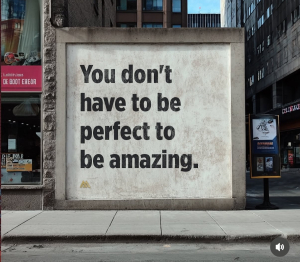-
.
Gareth Davies
The Power of Authenticity in Public Speaking
In a world full of content, what really cuts through is authenticity. That’s especially true in public speaking. People don’t remember every word you say—they remember how you made them feel. Being real, human and honest is what truly connects.
At The Presenter Studio, we’ve produced some of the UK’s biggest presenters. And we’ve learnt that the best communicators aren’t the most polished—they’re the most relatable. They’re confident in their message, but they’re also grounded in who they are.
So how do you speak authentically? First, use your own words. Avoid jargon or scripted lines that don’t sound like you. Speak the way you speak in real life—with a bit more clarity and purpose.
Next, share something personal. You don’t need to tell your life story. But a well-placed anecdote or insight can help you build a connection with your audience.
Finally, remember that authenticity doesn’t mean winging it. It means preparing well enough that you feel relaxed and in control—so your personality can shine through.
If you want to develop a natural, confident speaking style that still delivers impact, our bespoke coaching is here to help. Find out more at https://www.presenterstudio.com/business-presenter-training/presentation-skills-training
How to Overcome Nerves Before a Big Talk
Even the most confident professionals feel nervous before public speaking. The good news is, nerves are normal—and they can even help sharpen your performance. But when nerves take over, they can affect your delivery. That’s where training and preparation come in.
At The Presenter Studio, we work with clients who have to speak under pressure—live TV, investor meetings, high-stakes interviews. We’ve developed techniques to manage nerves and help you feel in control.
The first step is breathing. Shallow breathing fuels anxiety. Practice slowing your breath and grounding your voice from your stomach. This will also help you speak with more presence.
Visualisation is another helpful tool. Take a few minutes to picture yourself on stage, speaking calmly and clearly. It helps trick your brain into thinking you’ve already done it successfully.
And finally, focus on your audience—not yourself. Nervous speakers often worry how they’re being judged. But your job is to deliver value. Think about what your audience needs to hear and how you can help them.
To work with our team of TV producers turned communication coaches, explore our presentation skills training at: https://www.presenterstudio.com/business-presenter-training/presentation-skills-training
Public Speaking Tips That Actually Work
Public speaking can feel intimidating, even for experienced professionals. But with the right approach, it’s a skill anyone can improve. At The Presenter Studio, we coach people from all walks of life - CEOs, creatives, academics and brand spokespeople—helping them find confidence and clarity in how they speak.
One of the most effective tips is to prepare your structure, not your script. A good presentation has a clear beginning, middle and end, but it shouldn’t sound robotic. Knowing your structure helps you stay on track while still sounding natural and responsive.
Another tip is to slow down. Nerves often make us rush. But speaking more slowly gives your audience time to absorb what you're saying—and gives you time to think. Pausing can be powerful.
A third tip: don’t just speak at people—engage with them. Make eye contact. Ask questions. React to the room. Public speaking should feel like a conversation, not a lecture.
At The Presenter Studio, we believe that great public speaking is about being yourself—just your best, most confident version. Find out how we can help you improve at: https://www.presenterstudio.com/business-presenter-training/presentation-skills-training
Presenting isn't about being Perfect
Presentation Skills That Reflect Your Brand
Every presentation is a chance to communicate your brand. But often, people fail to consider how their style, language and delivery reflect who they are and what they stand for.
At The Presenter Studio, we don’t believe in cookie-cutter training. We tailor everything to you. That’s because we know that every brand, business and presenter is different. Whether you’re a startup founder speaking at an event, a senior leader running a boardroom meeting, or a charity ambassador doing press interviews, your presenting style should feel on-brand and on-message.
From our experience producing hundreds of hours of broadcast television, we understand how to craft a personal style that’s authentic, confident and credible. We bring that expertise into the business world—helping people present in a way that feels natural to them, but also aligned with their brand’s voice and values.
We work with some of the biggest names in business and media, delivering high-level presentation coaching that gets results.
If you want to represent your brand better in how you speak, pitch and present, visit: https://www.presenterstudio.com/business-presenter-training/presentation-skills-training
3 Mistakes to Avoid When Presenting to an Audience
Presenting isn’t just about what you say—it’s about how you say it. At The Presenter Studio, we work with CEOs, entrepreneurs and teams across industries to improve how they present. And we’ve seen three common mistakes that crop up time and time again.
The first mistake is information overload. It’s tempting to try and say everything. But when a presentation is too full of facts, it becomes hard to follow. We help our clients strip things back to a clear, compelling message that lands with impact.
The second mistake is lack of structure. A good presentation needs a clear beginning, middle and end. Without it, your audience can lose track. Our training focuses on building story-led structures that flow naturally and hold attention.
And the third? Hiding your personality. Too many people think they have to ‘perform’ in a certain way. But the most effective presenters are themselves. We help you present with confidence, warmth and authenticity, using our background in TV to coach real, human connection.
Want to avoid these mistakes and transform your presenting? Learn more at: https://www.presenterstudio.com/business-presenter-training/presentation-skills-training
Why Storytelling Is the Secret to Powerful Presentations
Storytelling is at the heart of every memorable presentation. No matter how data-driven or formal the content, if it lacks story, it often lacks impact.
At The Presenter Studio, we’ve spent over 20 years working in television—producing content for the BBC, ITV, Channel 4 and beyond. We know what keeps audiences engaged. And what we’ve learnt is that storytelling isn’t just for TV. It’s the most powerful tool you can use when delivering a presentation—whether to your team, investors, or clients.
A great story creates an emotional connection. It brings your message to life. People don’t just remember facts—they remember how you made them feel. A well-told story can simplify complex ideas, make people care, and inspire action.
In our presentation skills and storytelling training, we help professionals unlock their voice and find structure and clarity in how they present. We’ll show you how to build a presentation with a clear narrative arc, how to use real-life examples to illustrate your points, and how to deliver with authenticity.
If you're looking to transform how you connect with an audience, explore our bespoke training at: https://www.presenterstudio.com/business-presenter-training/presentation-skills-training
The Top Benefits of Media Training for Business Leaders
Strong communication is a hallmark of great leadership. Whether you're managing a team or speaking on behalf of a company, the way you deliver your message can influence perception, trust and engagement. Media training equips business leaders with the tools to communicate with clarity, confidence and authority.
One of the biggest advantages of media training is how it boosts self-assurance. Leaders often know what they want to say, but under pressure, it can be easy to lose focus or sound unsure. Training helps you stay composed, make your points effectively and manage difficult questions.
Another benefit is that it helps you sound like you, but your best version. Media training isn’t about rehearsed lines. It’s about finding your voice, knowing your message and delivering it in a way that feels natural.
Business leaders are often asked to speak at events, do interviews, or appear in internal communications. Being unprepared can lead to missed opportunities. Media training is not just about interviews with journalists. It's about making sure you come across well in all your communications.
If you're a senior professional looking to develop your communication skills, explore how our tailored sessions can help: https://www.presenterstudio.com/business-presenter-training/media-training
How Media Training Can Protect and Promote Your Brand
Your brand is one of your most valuable assets. One bad interview or poor media appearance can have long-lasting consequences. Media training gives you the skills to protect your reputation and promote your business in the right way.
When a journalist calls or a camera crew arrives, it's natural to feel nervous. Media training helps prepare you for those moments so you can stay calm, clear and in control. It teaches you how to stay on message, answer tough questions and present your business in a way that aligns with your values.
But it's not just about defence. Media training is a powerful tool for promotion too. Being able to confidently explain what your business does, why it matters and what makes it different is a skill that sets you apart from competitors.
Whether you're representing a start-up, a charity or a large corporation, media training ensures you make the most of every opportunity to build your profile. It's also an essential step if you're planning to appear in video content or speak at public events.
To find out more about how we work with brands to deliver results, explore our bespoke coaching options: https://www.presenterstudio.com/business-presenter-training/media-training
What Is a Media Training Course and Do I Need One?
Media training has become a vital part of modern communication for professionals who may face the press, appear on television, or speak in public. But what exactly is a media training course and who is it for?
A media training course prepares you to confidently handle media interviews, press appearances, and camera work. It's not just for celebrities. Business leaders, start-up founders and brand spokespeople all benefit from training that helps them communicate their message clearly and authentically. It’s about knowing what to say and how to say it in a way that feels genuine and lands well with your audience.
Whether you’re speaking on behalf of your business in a crisis, launching a new product, or simply building your profile, learning how to manage the media is essential. A good course will give you practical tools to deliver messages under pressure, avoid common pitfalls, and stay on-brand no matter the setting.
If you're considering a course, make sure it fits the needs of your role and industry. Some sessions focus on crisis communications, others on television appearances, and some on social media video content. At The Presenter Studio, our media training is tailored to you and your business, delivered by award-winning TV producers who understand how to bring the best out of you.
Visit our full range of training options here: https://www.presenterstudio.com/business-presenter-training/media-training










